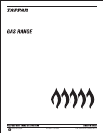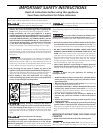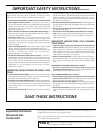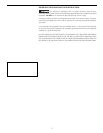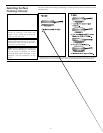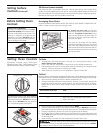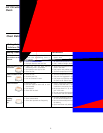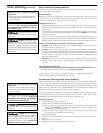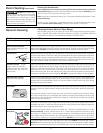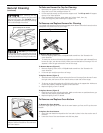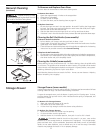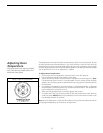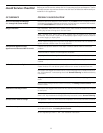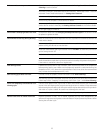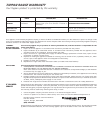
9
Easy Clean Oven (some models)
Porcelain has a smooth finish and is a type of glass fused to metal. Oven cleaners can be
used on all interior oven surfaces.
General Cleaning
Remove soils using hot, soapy water. Do not allow food spills with a high sugar or acid
content (such as milk, tomatoes, saukerkraut, fruit juices or pie filling) to remain on the
surface as they may cause a dull spot even after cleaning.
To Remove Heavy Soil
1. Allow a dish of ammonia to sit in the oven overnight or for several hours with the oven
door closed. Clean softened spots using hot, soapy water. Rinse well with water and
a clean cloth.
2. If soil remains, use a soap-filled scouring pad or a nonabrasive cleaner. If neccessary,
use an oven cleaner following manufacturer's instructions. DO NOT mix ammonia
with other cleaners.
3. Clean any soil from the oven frame, the door liner outside the oven door gasket, the
small area at the front center of the oven bottom and the oven vent exit (located below
the backguard). Clean with hot, soapy water. Rinse well using clean water and a cloth.
Adhere to the following precautions when using oven cleaners:
1. DO NOT spray on the electrical controls or switches because it could cause a short
circuit and result in sparking or fire.
2. DO NOT allow a film from the cleaner to build up on the temperature sensing bulb;
it could cause the oven to heat improperly. (The bulb is located in the rear of the oven.)
Carefully wipe the bulb clean after each oven cleaning, being careful not to move the
bulb. A change in its position could affect how the oven bakes. Avoid bending the
bulb and capillary tube.
3. DO NOT spray any cleaner on the oven door trim or gasket, handles or any exterior
surfaces of the range, wood or painted surfaces. The cleaner can damage these
surfaces.
Cleaning the Oven Bottom
The oven bottom in porcelain enamel oven models can be removed for cleaning. See
"To Remove and Replace Oven Bottom" under General Cleaning.
Clean using hot, soapy water, a mild abrasive cleanser, a soap-filled abrasive pad
or oven cleaner following manufacturer's instructions.
Continuous Cleaning Oven (some models)
Continuous cleaning ovens have a special coating which is a porous ceramic material.This
rough coating tends to prevent grease spatters from forming little beads which run down
the side walls leaving streaks that require hand cleaning. Instead, when spatter hits the
porous coating, it disperses and is partially absorbed. This spreading action increases the
exposure of oven soil to heated air, making it less noticeable.
Soil may not disappear completely. Remaining soil will gradually fade with continued oven
use. The special coating works best on small amounts of spatter. Larger spills, or spills
generating from sugar, egg and dairy mixtures, do not clean as well.
If difficult soils occur:
1. Remove the oven racks and cookware.
2. Remove soils by completing steps a or b below:
a) Use hot, soapy water and wash soils using a nylon-bristly brush or a nylon mesh
scouring pad. DO NOT rub or scrub with paper towels, cloths or sponges. They
will leave lint on the oven coating.
b) Apply ammonia with a sponge and dab it into the porous coating. Leave the
ammonia on the soiled area for 30 minutes.
3. Rinse with clear water.
4. Close the oven door and push in and turn the Temperature Control knob to 450°F
(230°C).
5. Operate oven for 15 minutes.
6. Remaining soil will fade with continued oven use.
Oven Cleaning (continued)
Adhere to the following cleaning
precautions:
• Allow the oven to cool before cleaning.
• Wear rubber gloves when cleaning the
range manually.
REMOVE SPILLOVERS AND HEAVY SOILING AS
SOON AS POSSIBLE. REGULAR CLEANINGS
WILL REDUCE THE NUMBER OF MAJOR
CLEANINGS LATER.
Ammonia must be rinsed
before operating the oven. Provide adequate
ventilation.
Adhere to the following cleaning
precautions:
• Allow the oven to cool before cleaning.
• Wear rubber gloves when cleaning the
range manually.
REMOVE SPILLOVERS AND HEAVY SOILING
AS SOON AS POSSIBLE.REGULAR
CLEANINGS WILL REDUCE THE NUMBER
OF MAJOR CLEANINGS LATER.
Ammonia must be rinsed
before operating the oven. Provide adequate
ventilation.
DO NOT use oven cleaners,
gritty cleansers, coarse abrasive pads or
brushes, silicone sprays or metal scrapers on
the interior walls, oven frame or ceiling of a
continuous cleaning oven. Permanent
damage to the oven may result.
DO NOT line the oven walls,
bottom, racks or any other part of the range
with aluminum foil. Doing so will destroy heat
distribution, produce poor baking results and
cause permanent damage to the oven interior
(aluminum foil will melt to the interior surface
of the oven).



